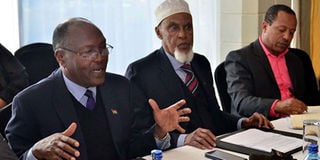BBI team yet to agree on contentious issues as D-Day draws near

The Building Bridges Imitative Task Force holds a consultative forum with the Ethiopian Federal Reconciliation Commission at Intercontinental Hotel on June 13, 2019. PHOTO | FILE | NATION MEDIA GROUP
What you need to know:
- The BBI team, now formally known as the Steering Committee on the Implementation of the Building Bridges to a United Kenya Task Force, had hoped to have the final report ready after its retreat two weeks ago.
- However, that was not possible as the committee and the team of experts could not agree on the contentious issues. The retreat was held at Safari Park Hotel along Thika Highway.
- In fact, one of the joint secretaries of the committee, Mr Martin Kimani, had indicated the committee would have a report ready after the retreat ahead of June 30, when their mandate expires.
Experts appointed by President Uhuru Kenyatta and ODM leader Raila Odinga to the Building Bridges Initiative Committee have been unable to agree on a number of contentious issues as the deadline for the team’s work draws closer.
The restructuring of the Judicial Service Commission (JSC), the place of other constitutional commissions, granting Nairobi County a special status and the economic model for the country have generated heated debate within the committee and their team of experts.
The BBI team, now formally known as the Steering Committee on the Implementation of the Building Bridges to a United Kenya Task Force, had hoped to have the final report ready after its retreat two weeks ago.
However, that was not possible as the committee and the team of experts could not agree on the contentious issues. The retreat was held at Safari Park Hotel along Thika Highway.
In fact, one of the joint secretaries of the committee, Mr Martin Kimani, had indicated the committee would have a report ready after the retreat ahead of June 30, when their mandate expires.
After the first retreat failed to resolve the contentious issues, the committee is currently in Machakos County for a second retreat, hoping to iron out the issues and hand over its report and reform proposals by June 30.
The Steering Committee comprises Senator Yusuf Haji as the chairman and members Bishop Lawi Imathiu, Woman Rep Maison Leshomo, Mr James Matundura, Ms Rose Museu, Ms Agnes Kavindu Muthama, Prof Saeed Mwaguni, Bishop Peter Njenga, Archbishop Zacheaus Okoth, Prof Adams Oloo, Senator Amos Wako, Dr Florence Omose, Prof Morompi ole Ronkei and Major (Rtd) John Seii. The joint secretaries of the committee are Mr Kimani and lawyer Paul Mwangi.
The team of experts that has been working with the committee was appointed following the BBI task force’s recommendation for appointment of effective technical committees “to turn the report’s recommendations into the legal, policy and administrative measures required for implementation.”
On the JSC, the contention is on who should sit on the commission. A source within the team told the Saturday Nation that the debate to make the JSC more independent has revolved around two schools of thought: first that the commission is currently dominated by judicial officers, which in a bid to protect their own, has been reluctant to entertain complaints against judges and magistrates.
As currently constituted, judges and magistrates occupy five seats in the 11-member JSC.
A section of experts want this arrangement altered to have more “independent” outsiders in the commission. Those fronting this school of thought have also questioned why the Chief Justice should automatically chair the JSC.
This argument has the support of lawyer Nzamba Kitonga, who chaired the now defunct Committee of Experts (CoE) that midwifed the 2010 Constitution.
Mr Kitonga says the nomination of people to be appointed as judges of the Court of Appeal demonstrates why JSC should not be dominated by the Judiciary.
“I think it was a mistake to recommend that JSC should be dominated by the judiciary. This (nomination of Court of Appeal judges) is one such reasons it should not be dominated by the judiciary,” said Mr Kitonga.
On the opposite side, the argument is that the JSC as it is currently has more than enough members representing the Executive, which puts at risk the independence of JSC and the Judiciary in general.
The Attorney-General, who is an appointee of the President, has an automatic seat in the commission as is the representative of the Public Service Commission, also an appointee of the President. In addition, the President appoints two non-lawyers to sit in the JSC as public representatives. That directly gives the Executive four votes in the commission.
The contention about granting Nairobi County a special status, as had been recommended by the BBI report, has been more about how it will work out without watering down the principle of devolution.
On the economic model, the task force report had noted that Kenyans were complaining of an economy that is exclusively controlled by a small elite and that there was need for a radical overhaul of the economic model.
“Obviously there are those who may not want the status quo – which gives them immense privileges – to change and there are those who wish to go by what Kenyans demanded,” a source said of the ongoing talks inside the Steering Committee’s retreat.




